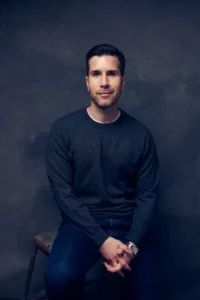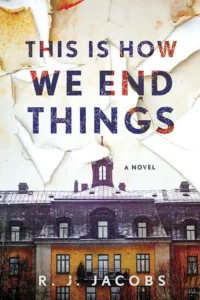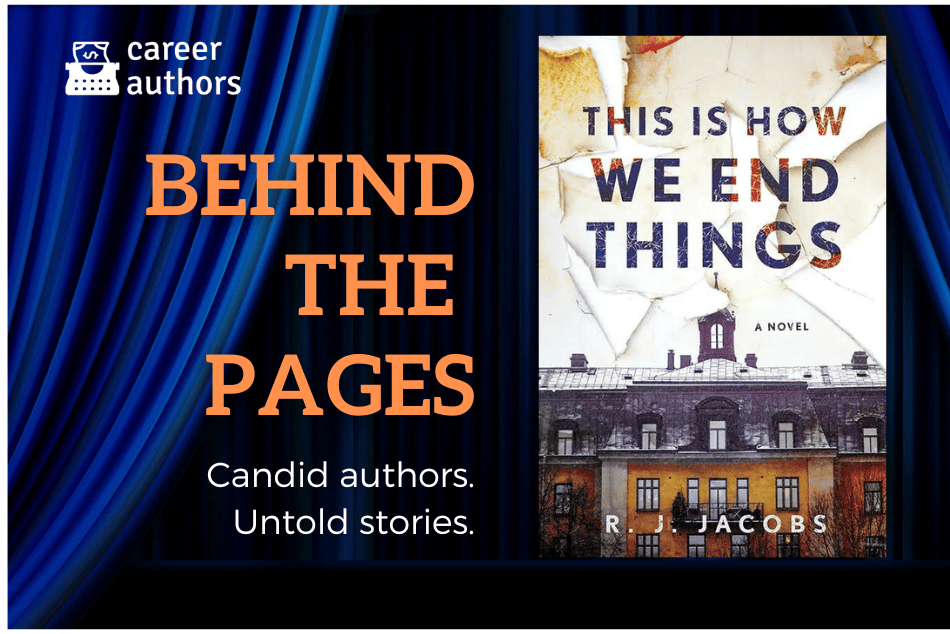What does a practicing psychologist who has taught abnormal psychology and performs PTSD evaluations for veterans write about in a thriller? Well, write what you know, right? And write what you fear.
(And look what R. J. Jacobs reveals about his characters’ names.)
1. What’s the title of your book—and was that always the title?
The title of the book is: This Is How We End Things. I smiled this first time I heard it because thought it sounded ominous and intriguing, and could really picture it representing the story. Originally, the title was: You Think You’re So Smart, which I thought captured some of the mistrust people have for the field of Psychology and the deceptive elements of the research being conducted. Maybe that one will come in handy for a sequel.
2. Who’s the main character of your book—and was that always their name?
The book is told from multiple points of view—the main characters are: Robert, Scarlett, Mark, Larson, Chris, and Britt. I’m terrible at making up character names that don’t sound completely made-up, so I usually start with names of my fiends to help me picture the story’s action. I either change the names before I submit a first draft, or leave them in if my friends find it amusing. The plot this time was pretty complicated, so I used the actors in the Marvel movies to help me get going. No one seemed to notice.
3. At the start of the book, what’s the character’s goal?
A group of graduate students and their professor conduct intense research in a psychology department at a university in North Carolina. Academia has its own inherent pressures, but the stakes are higher in this case because the study is pretty questionable, ethically. Mostly the characters all want to finish their dissertations and graduate with some notoriety in their field.
4. What was the core idea for this novel—a plot point? a theme?—and where did it come from?
The novel’s central theme is that deception, even if it’s well-intended, can have disastrous consequences. I wanted to capture some of the apprehension people often feel around psychologists and delve a little into the field’s research history. I helped conduct an experiment like the one depicted in the story when I was a student and learned quickly during the debriefing sessions that participants didn’t particularly enjoy feeling tricked. Deception is a gray area in psychological studies because it can lead to incredible insights but that come at a cost.
5. At what point did you come up with the final version of the first line? What is it?
I’m a relentless second-guesser, so it may have been a very late draft.
“This is confidential, right?”
The opening is an interview that’s later integrated into a psychological report. I borrowed the report template from a friend who mainly does forensic assessment so that I would get the cadence and structure accurate.
6. Did you know the ending of the book when you started?
I did, but not how we would get there.
7. What’s something in this book that you’ve never done before?
This is my first attempt at multiple POVs. It was a challenge in some ways, but fit with the story and the ensemble cast. It also has some advantages in a mystery: some characters can know things that others don’t.
8. What part of your tour are you most excited about?
The travel part is pretty fun because I sometimes end up in places I’ve never been before. It can feel like an adventure, and gives you an awesome reason to see unfamiliar cities. I like meeting people who’ve read the books. Hearing that they enjoyed the stories motivates me to keep going with writing.
9. Who in your #writingcommunity deserves a special shout-out for supporting you in writing this story? Why?
The marketing team at Sourcebooks. Particularly Anna Venckus, Emily Engwall, and Cristina Arreola. All above and beyond, consistently.
10. How do you want readers to feel when they close the book?
What a great question! It’s all about the experience, isn’t it? I hope they feel satisfied, and getting back to the idea of travel, like they’ve been on a trip to a new, interesting place. I always like books where I learn a little something, too. Ideally, readers will have a new idea to ponder.
11.What did you learn from this book? About writing, or life, or the writing life?
The first thing that comes to mind is that I learned about a medical condition that becomes a key part of the story. For that part to work, it had to be rare, obvious, and distinctive. It didn’t become part of the story until late. That’s one of the interesting things about writing a novel, the author gets to know the characters better through the process.

 R.J. Jacobs has practiced as a psychologist since 2003. He maintains a private practice in Nashville, focusing on a wide variety of clinical concerns.After completing a post-doctoral residency at Vanderbilt, he has taught Abnormal Psychology, presented at numerous conferences, and routinely performs PTSD evaluations for veterans. His novel And Then You Were Gone was published in 2019 by Crooked Lane. His second novel: Somewhere In the Dark, was published in August 2020. His current novel is This Is How We End Things (Sourcebooks, 2024), which Megan Miranda called “A captivating exploration into the psychology of lying, and a high-stakes, dark-academia thriller full of twists and secrets.”
R.J. Jacobs has practiced as a psychologist since 2003. He maintains a private practice in Nashville, focusing on a wide variety of clinical concerns.After completing a post-doctoral residency at Vanderbilt, he has taught Abnormal Psychology, presented at numerous conferences, and routinely performs PTSD evaluations for veterans. His novel And Then You Were Gone was published in 2019 by Crooked Lane. His second novel: Somewhere In the Dark, was published in August 2020. His current novel is This Is How We End Things (Sourcebooks, 2024), which Megan Miranda called “A captivating exploration into the psychology of lying, and a high-stakes, dark-academia thriller full of twists and secrets.”





